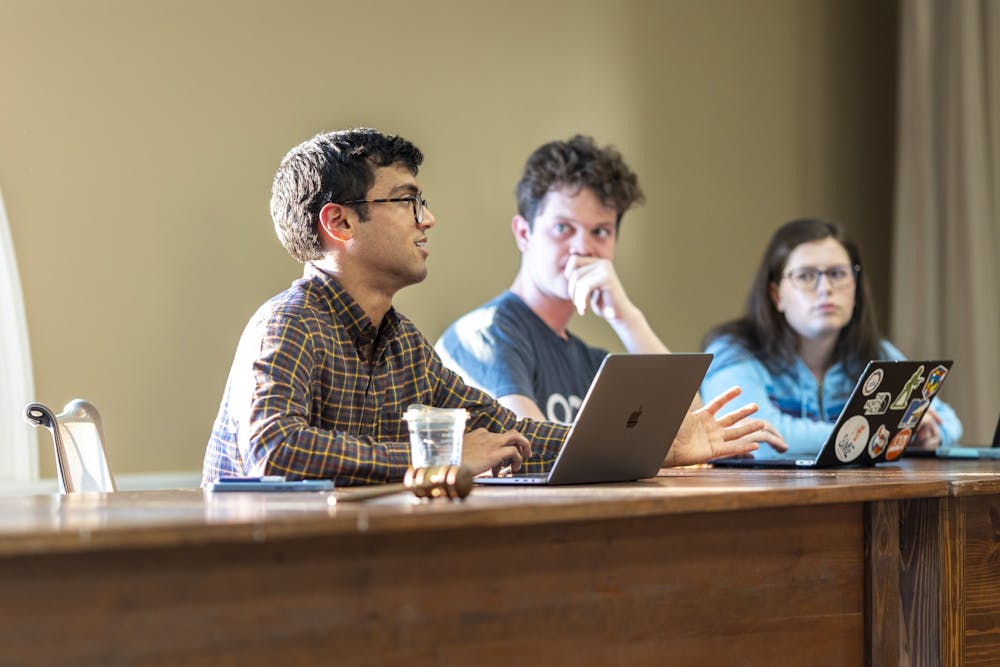The Honor Committee met Sunday to hear a proposal for a new academic course for sanctioned students, as well as to informally vote on a co-sponsorship with the Accomodation Access Fund. In the second meeting of the term and for the first time since the new committee was elected, quorum was not reached and the Committee could not vote on constitutional or bylaw matters as only thirteen out of 21 members were present.
In early March, the multi-sanction system was formally passed by the student body. The multi-sanction system — which will go into effect July 1 — transforms the current Honor system by expanding the possible sanctions from a two semester leave of absence to include, but not be limited to, a temporary leave of absence, expulsion, education and amends.
William Hancock, Honor educator and first-year College student, presented a proposal to the Committee to create an rehabilitative academic course that would serve as the education sanction under the new system.
The tentative plan involves a four to seven week course that meets twice a week for students who have been found guilty and sanctioned with education. Led by a combination of Honor educators, guest speakers from the Committee, professors and former offenders, the course would allow offenders to analyze their personal values and reflect on the Honor system.
Honor educators make up one of three pools for Honor support officers. Support officers are made up of advisors, counsel and educators. These pools are filled by students who are dedicated to the Honor system, and these pools help to assist accused students in the trial process.
“The whole idea of this course is [for the student] re-committing themselves to the community of trust and restoring their place in that community,” Hancock said.
Though the Committee could not vote formally on the proposal because they had not met quorum, Committee members considered the possible obstacles to the course’s implementation. Third-year Architecture representative Rep. Maille Bowerman asked whether or not Honor educators and students who lead the course would be compensated.
Rachel Liesegang, vice chair for the undergraduate community and third-year College student, said she sees the course as a chance to increase educator involvement in the Honor system, but also worries that if paid, student instructors would face blurred lines of responsibilities as academic students and employees of the University. The Committee did not make a final decision on whether these positions would be paid.
Second-year College student Rep. Jonathan Swap also shared concerns over inclusion, questioning how the course should be offered to students with extenuating circumstances such as English not being their native language.
“[We should be] making sure that they can access all the courses, principles and thoughts and help them get committed to the Honor system,” Swap said.
The Committee also announced sub-committee chairs. Graduate Architecture student Rep. Tim Dodson will be the representative co-chair of the Policies and Procedures Committee. Dodson will oversee the examination of procedures and written by-laws in order to help the P&P Committee recommend changes when necessary.
Third-year Commerce student Rep. Brianna Kamdoum will chair the Faculty Advisory Committee and coordinate with faculty advisors.
The Committee later heard a pending co-sponsorship request from Accomodation Access Fund — a group that helps students pay for the required evaluations from medical professions to receive Student Disability Access Center accommodations. Honor co-sponsorships are partnerships with Contracted Independent Organizations across Grounds that help fund their events and initiatives. AAF made its initial proposal to the Committee earlier this semester. Due to the relatively large co-sponsorship amount of $5,000, their proposal was placed on hold for further discussion.
Ellie Wilkie, outgoing vice chair for the undergraduate community and fourth-year College student, voiced her support of AAF, urging Committee members to vote favorably for the co-sponsorship. Wilkie attended the meeting solely to show her support for AAF following the postponement of the co-sponsorship during her own term.
“A lot of kids don't have what they need simply because they don't have enough money to get testing done,” Wilkie said. “I think [the co-sponsorship] is absolutely integral to Honor both internally and philosophically.”
The Committee voted unanimously to pass the co-sponsorship, but falling short of quorum, the vote was informal and funding must be formally ratified at a later meeting.
The Committee also heard executive and school updates — there was one hearing on Sunday morning. The Committee is also working on organizing town halls across the University for faculty to give input on sanctioning.
The Committee entered into a closed session at 7:58 p.m. and then adjourned the meeting at the scheduled end time of 8 p.m. The next Honor Committee meeting will be held Sunday at 7 p.m. in the Trial Room of Newcomb Hall.







